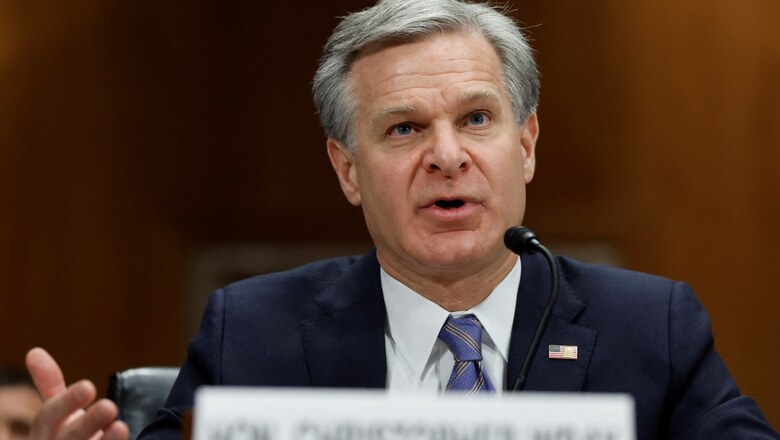
views
A Federal Bureau of Investigation (FBI) director is coming to India after 12 years, and after the handshakes and smiles for the cameras, some straight, unpleasant talk awaits him.
US federal prosecutors have accused an Indian citizen and an unnamed Indian official of being involved in a failed plot to kill Khalistan separatist Gurpatwant Singh Pannun on US soil. India has squarely denied it.
When FBI chief Christopher A Wray visits India on December 11-12 to meet National Investigation Agency (NIA) chief Dinkar Gupta, three main issues are likely to be on the table: Khalistan terrorism, gangster nexus, and Pakistan-sponsored terrorism in Jammu and Kashmir.
This is India’s opportunity to assertively and unhesitatingly get two points across. One, that it does not expect ‘friendly nations’ like the US, Canada, UK or Germany to harbour declared terrorists like Pannun or Hardeep Singh Nijjar and act as nurseries of terror and separatism against India.
Pannun, who looks and speaks like a caricature of himself, has been repeatedly threatening violence against Bharat, the latest being a call to bomb Air India flights. One could have laughed it off as his usual unintended clownery if Khalistanis had not carried out the 1985 Air India bombing, the deadliest aviation terror attack before 9/11. All 329 people on board the Montreal-London-Delhi-Mumbai flight were killed.
Some of the worst criminals and terrorists in the Khalistan ecosystem, which has long been baked and bankrolled by Pakistan’s ISI, find sanctuary in the US, Canada, UK and other Western nations. None of them have been turned over to India for trial. Canadian Prime Minister Justin Trudeau actively encouraged them, calling a wanted terrorist like Nijjar, who entered Canada by fraud, as “a Canadian citizen”.
A nation cannot be a friend of another nation while harbouring elements that seek the friend’s destruction.
Second, India should now assert its right to act overseas if another nation knowingly, even after being handed dossiers, harbours terrorists working against its security and sovereignty.
If the US talks about respecting international law, India should throw back the US’s own lawbook on this matter, and the fat file that lists transgressions by the US intelligence and security agencies on foreign soil.
An executive order issued on February 19, 1976, by then US President Gerald Ford had prohibited any member of the US government from engaging or conspiring in any political assassination abroad. This came after the CIA’s attempts to assassinate Cuban leader Fidel Castro in the 1960s got exposed. It was the first executive order to ban assassinations.
But the ban did not prevent Reagan’s men from bombing Libyan leader Muammar al-Qaddafi’s house in April 1986 in retaliation for a bombing attack at a Berlin discotheque. Then, President Bill Clinton authorised the covert use of lethal force against al-Qaeda’s leader, Osama bin Laden, and other top terrorists.
After the September 11 attacks, covert overseas kills got an official stamp in the US. The Congress passed a joint resolution authorising President George W Bush to “use all necessary and appropriate force against those nations, organisations, or persons he determines planned, authorised, committed, or aided the terrorist attacks”.
Although assassinations were not explicitly mentioned, the resolution had a brush broad enough to authorise actions that otherwise would be banned under previous executive orders. Bush later widened the scope of Clinton’s authorisation of secret lethal force, permitting the CIA and US special forces to kill anyone on a “high-value target list” even without his stated approval.
Targeted killings by military drones started against Taliban leaders in Afghanistan and Pakistan, culminating in the May 2011 killing of Osama bin Laden by Navy Seals in Abbottabad, Pakistan.
As recently as 2020, US drones took out Iranian major general and commander of the Quds Force Qasem Soleimani near the Baghdad airport.
The list is much longer than the shadow of an approaching US-hired assassin. America should not give moral lessons on covert action to India.
For a rising Bharat, the time to assert its right to take out its enemies — even in an uncooperative friend’s home — to defend its land and people, is now.
Abhijit Majumder is a senior journalist. Views expressed in the above piece are personal and solely that of the author. They do not necessarily reflect News18’s views.




















Comments
0 comment